AI SEO Explained: What It Is and How to Use It
SEO has always been about staying one step ahead, keeping up with Google’s algorithm changes, understanding what people are searching for, and creating content that ranks well.
But in recent years, a major shift has started to take shape: AI SEO.
This means using artificial intelligence to make your SEO efforts smarter and more efficient.
With tools that handle tasks like keyword research, content optimization, and technical audits, marketers can now work faster and more strategically than ever before.
In this article, we’ll explore what AI SEO is and give you actionable tips to start leveraging these technologies in your strategy today.
What is AI SEO?
At its core, AI SEO involves applying artificial intelligence to various SEO tasks like keyword research, content creation, and competitor analysis to make them faster, smarter, and more accurate.
AI technologies used in SEO include:
- Machine learning (ML): Helps identify patterns in search data and predicts trends.
- Natural language processing (NLP): Enables tools to understand and generate human-like text, improving content relevance and readability.
These technologies are powering a new wave of AI SEO tools, such as Nightwatch and ChatGPT, which can help you reduce guesswork in your strategies and work faster.
Benefits of Using AI in SEO
AI enhances SEO in multiple ways, giving you a competitive edge.
Here’s how:
- Faster, Smarter SEO: AI SEO helps you get more done in less time. According to Forbes Advisor, 70% of businesses say that using AI tools like ChatGPT has sped up their content production. It enhances tasks such as keyword research, content writing, and site analysis, allowing you to improve your rankings and results without spending hours on manual work.
- Improved Keyword Research and Analysis: AI keyword research tools can process massive datasets to find high-potential keywords, understand search intent, and even predict emerging trends.
- Automated Content Creation: Some AI tools can optimize your content for better search rankings. They suggest better keyword usage, improve semantic relevance, and ensure content quality. They can even generate entire blog posts or product descriptions at scale.
- Enhanced User Experience: Get tailored content recommendations using AI. This can improve engagement metrics, such as time on site and bounce rate.
10 Ways to Use AI for SEO
AI SEO works by automating processes that used to take hours or days.
As of 2026, 86% of SEO professionals have integrated AI into their SEO strategies. This has resulted in a 45% increase in organic traffic and a 25% increase in conversions.
That’s because using AI tools like Nightwatch SEO AI Agent and ChatGPT makes it easier for SEOs to uncover insights and optimize content faster than ever.
If you want to experience similar results, here’s a deeper look at the key tasks you can perform using AI:
1. Keyword Research
Keyword research is the foundation of SEO. Knowing what your audience is searching for helps you create relevant content that gets discovered.
And now, with the help of AI, you can uncover high-potential keywords, predict upcoming trends, and understand user intent more accurately than manual methods.
Once you’ve signed up for the AI agent, all you have to do is feed in a prompt like this one:
“Give me a list of high-traffic, low-competition keywords related to [your topic or niche]. Include search volume and difficulty if available.”
I tried that with a search term in the natural hair growth niche, and the AI instantly generated a comprehensive list of keywords, including their competition levels, search volume, and bid range.
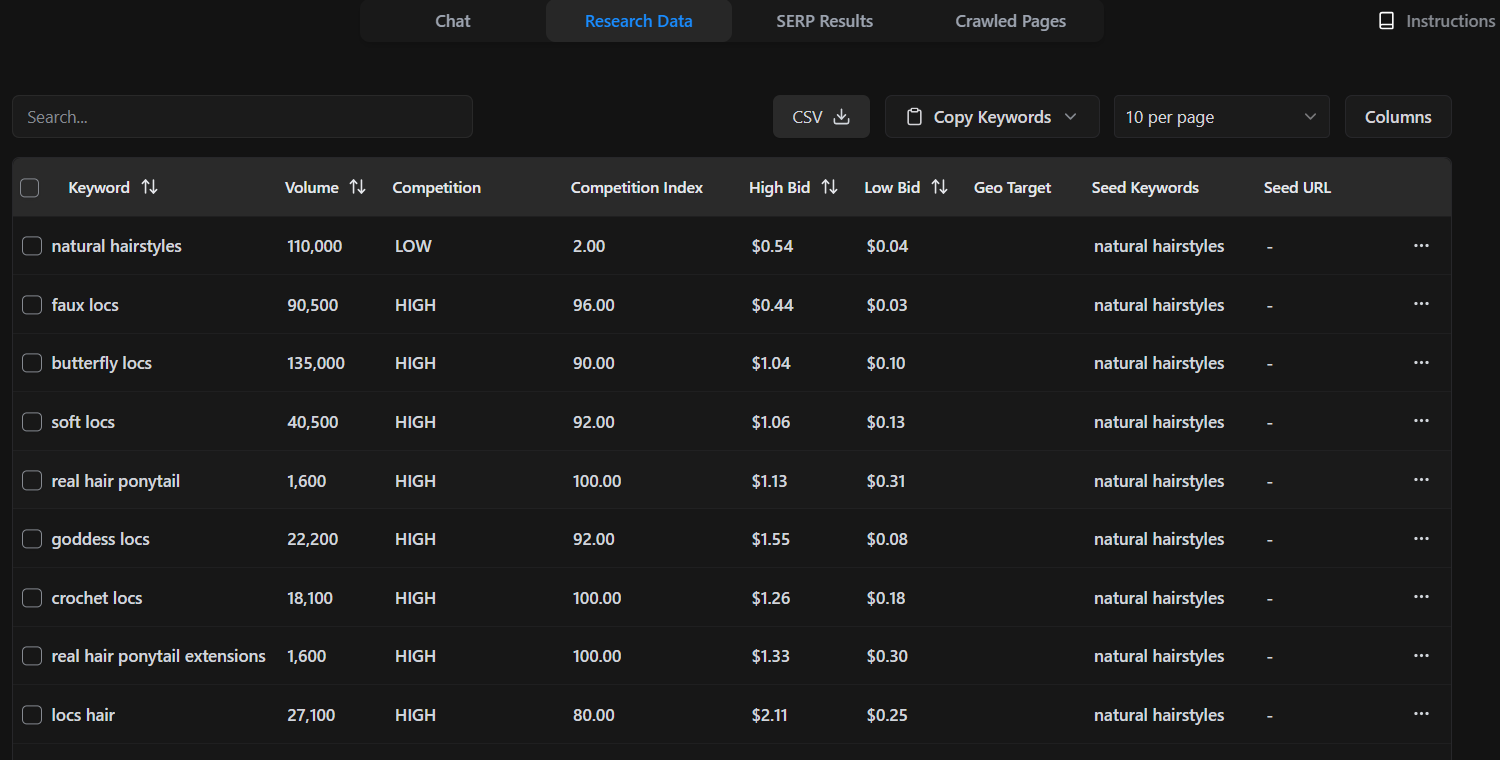
And if I need those keywords grouped into keyword or topic clusters, I can do that with an additional prompt:
“Group these keywords into relevant keyword clusters based on search intent and semantic similarity.”
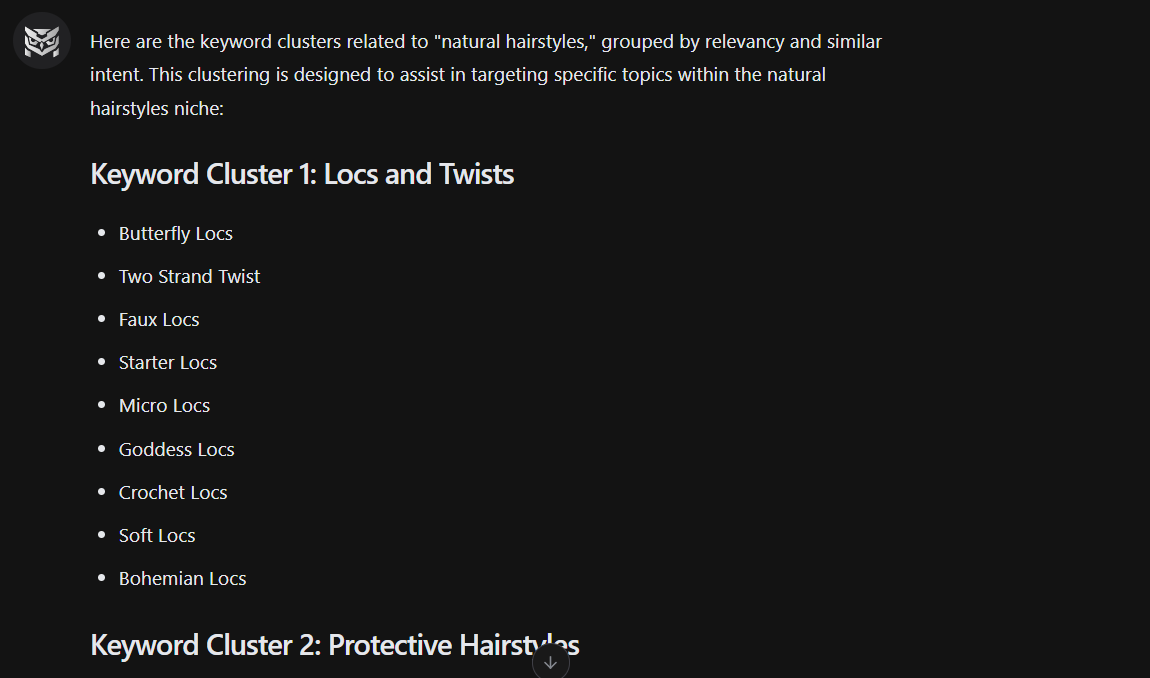
You can surface even more keyword suggestions by asking the AI to crawl your site and those of your competitors. It can even track SERP changes to predict trending keywords over time.
2. Content Optimization
Picture yourself hunched over your desk, researching, digging up stats, and typing away for hours. I’m sure little sweat beads of frustration are beginning to form around your temple. That’s the cost of creating great content manually.
Fortunately, there are AI content optimization tools that can do all this for you. You can use a tool like Perplexity to conduct detailed research on a given topic:
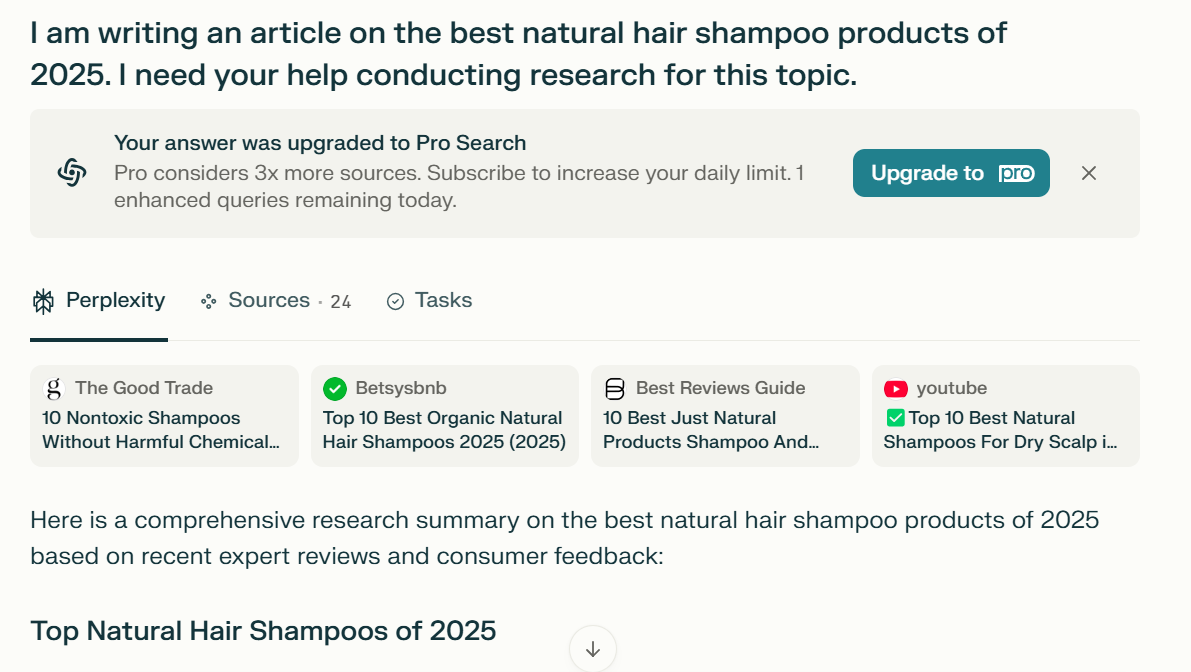
Then feed all that information into ChatGPT or the AI agent to write your content.
Here’s a pretty straightforward prompt for this:
“Write an SEO-friendly blog post on [insert topic] based on the research data provided. The post should include a catchy title, an engaging introduction, subheadings, and a clear conclusion. Use simple language and active voice, and naturally include keywords like [insert target keywords]. The tone should be [insert tone: e.g., informative, conversational, professional]. Aim for [insert word count] words.”

The AI will ensure your keywords are used naturally, check semantic relevance, improve readability, and enhance on-page SEO.
Nightwatch and ChatGPT can also analyze your existing content and highlight missing keywords or over-optimized sections.
If you’re stuck on a section of your content, consider asking ChatGPT to rewrite or expand a paragraph for improved SEO.
For instance:
“Rewrite this article to include the keyword ‘best hair growth shampoo’ in a natural way.”
It will suggest tweaks for meta tags, headings, and content structure to align better with SEO best practices.
3. Website Audits
Even if your content is top-notch, technical issues can cripple your SEO performance.
You may have broken links, slow-loading pages, and missing meta tags. But luckily for you, AI can quickly scan for these issues and offer quick fixes.
So, head to the AI agent, select “Technical SEO,” and ask the agent to run a site-wide crawl to detect technical SEO issues using this prompt:
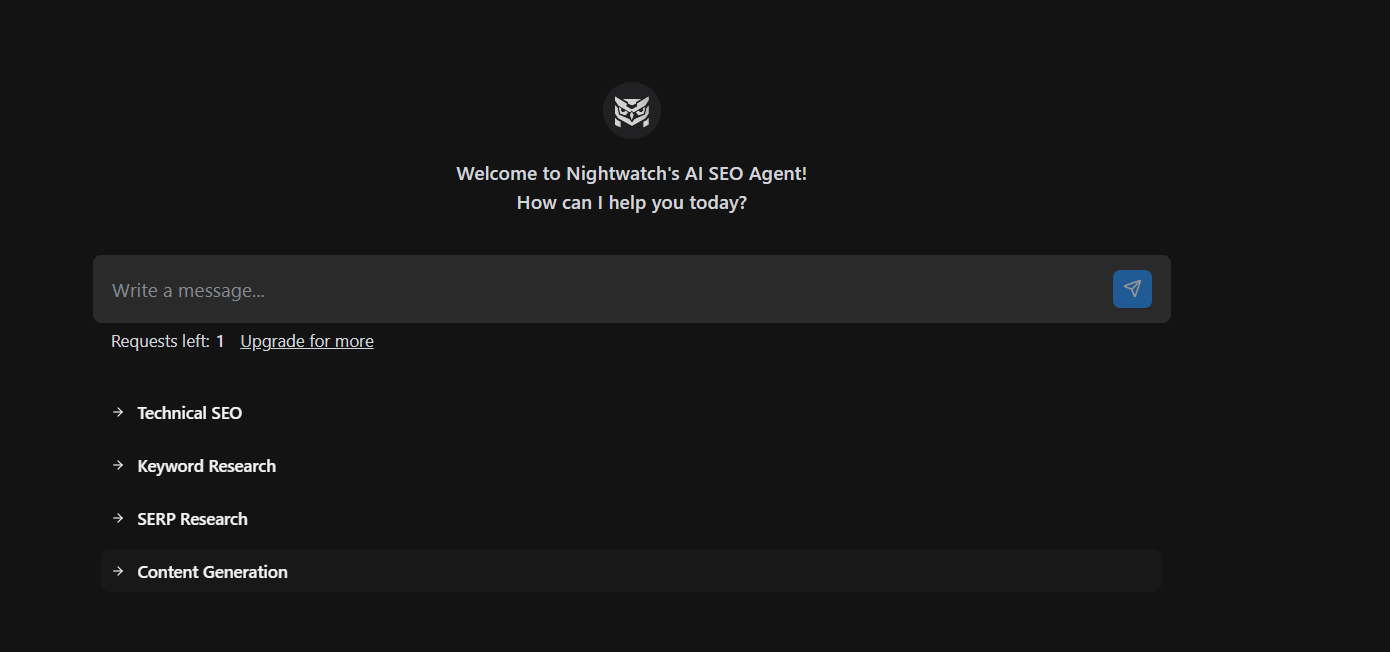
“Perform an SEO audit for the website [insert URL]. Identify technical issues, on-page SEO problems, broken links, slow-loading pages, and missing meta tags. Provide suggestions for improving site speed, mobile responsiveness, keyword usage, and overall SEO performance.”
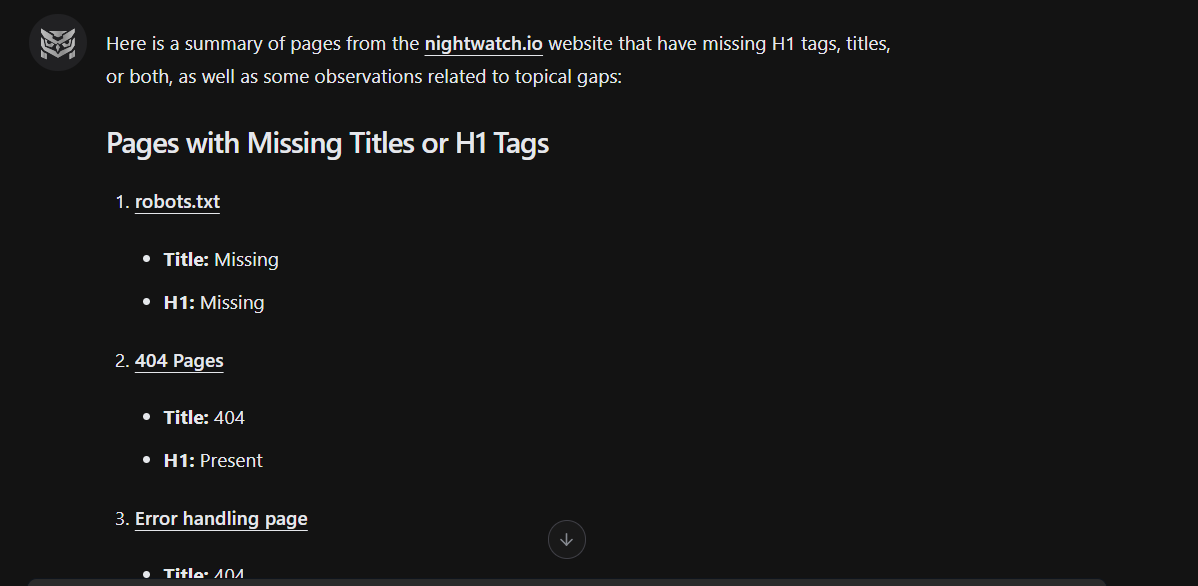
You’ll get detailed reports that highlight crawl errors, duplicate content, mobile usability issues, and more.
You can equally get a similar troubleshooting guide from ChatGPT by asking it to interpret complex audit results.
Example: “Explain how to fix a canonical tag issue for a beginner.”
It will give you step-by-step instructions on resolving common errors detected in the website audit.
4. Finding Backlink Opportunities
Backlinks remain one of the most important ranking factors in SEO. When high-quality websites link to your content, it signals to search engines that your site is trustworthy and authoritative.
The challenge, of course, is finding those link opportunities that are both relevant and attainable.
That’s where AI tools come in.
Instead of manually combing through search results or competitor link profiles, AI analyzes patterns, like which sites tend to link to content in your niche, what kind of articles they prefer, and how authoritative they are.
For example, if you’re using the Nightwatch SEO AI Agent, the platform can automatically pull up a list of backlinks your competitors have recently earned.
Here’s a prompt you can use for that:
“Show me the most recent backlinks earned by my top competitors in [insert niche or industry]. Include the referring domains, anchor text, and the page URLs where the links appear.”
Once it identifies promising sites, it goes a step further by recommending similar backlink opportunities tailored to your content. It can even generate outreach templates to help you start with pitching.
If you’re using ChatGPT, it can act like your personal outreach strategist.
Just prompt it with something like, “Write a friendly email to pitch my AI SEO article to a tech blogger,” and it’ll give you a conversational, engaging message you can tweak and send.
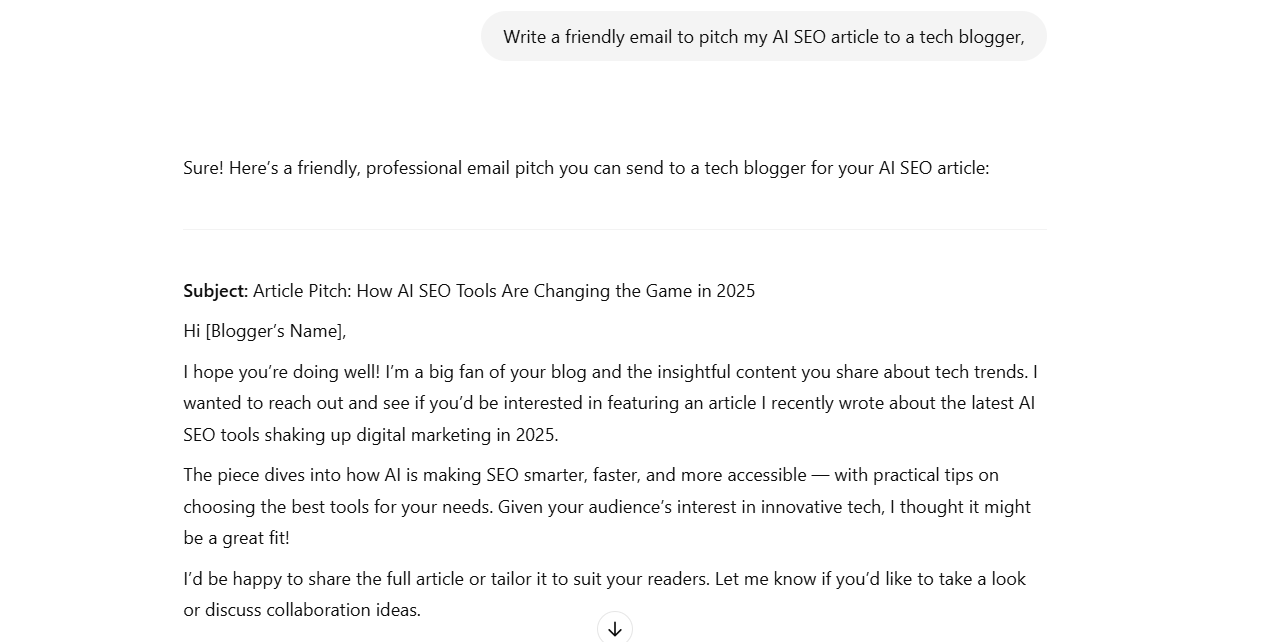
Additionally, it can review your content to help you identify linkable assets, things like in-depth guides, original research, or useful tools that others would want to reference.
5. Competitor Analysis
Competitor analysis helps you identify gaps in your SEO strategy and discover new opportunities to get ahead. It helps you to find untapped keywords and spot backlink sources so you can make smarter, data-driven decisions.
AI makes this process faster, sharper, and more actionable by highlighting exactly where you’re lagging or where your competitors are vulnerable.
With the Nightwatch SEO AI Agent, you can explore a competitor’s domain and instantly see which pages and keywords are bringing them the most traffic.
The AI then summarizes their SEO strengths and weaknesses, such as under-optimized pages or missed keyword opportunities. From there, it provides tailored suggestions on how to outrank them.
This might include targeting specific long-tail keywords they’ve overlooked, optimizing your content in smarter ways, or replicating their best backlink sources with a fresh angle.
ChatGPT adds another layer of strategy to your analysis. You can prompt it to break down a competitor’s blog or content strategy in plain language.
For example, ask, “Analyze the blog strategy of wikipedia.com,” and it will point out patterns in their publishing schedule, the types of posts they prioritize, their tone of voice, and what makes their content stand out.
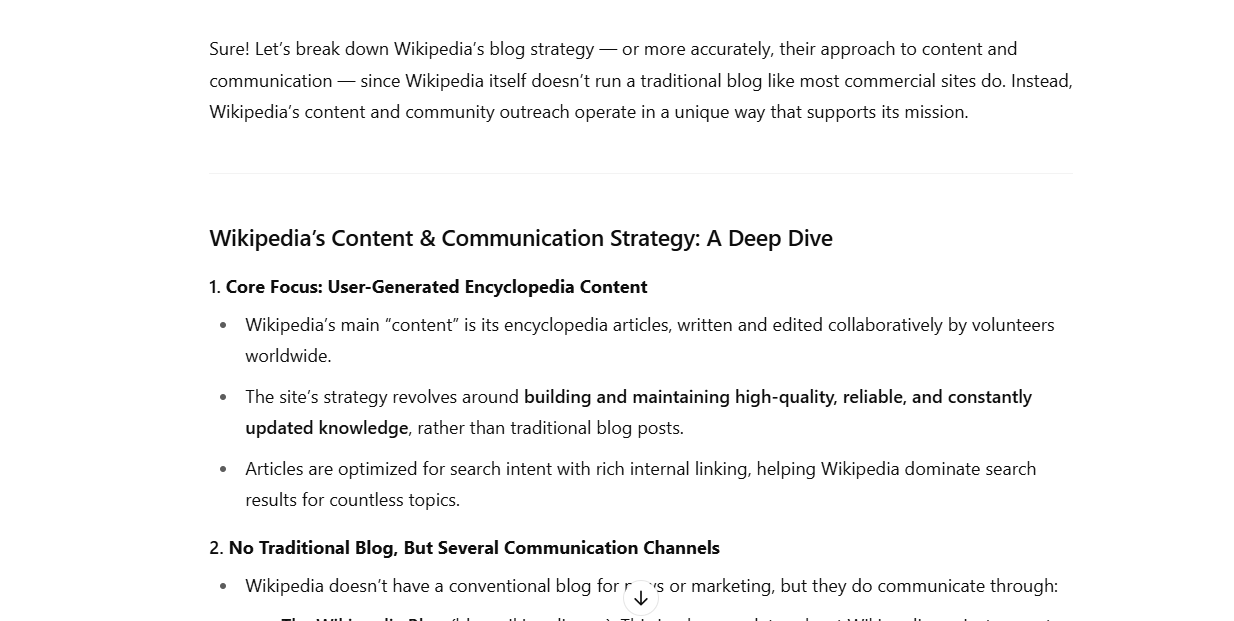
Once you have that insight, you can also use ChatGPT to brainstorm content ideas that could outperform theirs, perhaps by going deeper into a topic, adding fresh data, or presenting it in a more engaging format.
6. SEO Performance Monitoring
Regular tracking helps you measure the return on your SEO investments, catch sudden drops in traffic before they snowball, and spot early signs of success you can build on. Without consistent monitoring, you’re flying blind.
Take the Nightwatch SEO AI Agent, for example. It’ll give you detailed insights into keyword movements, SERP volatility, and changes in your search visibility. And with Nightwatch’s AI tracking, you can also monitor how your brand appears in AI-generated search results. More importantly, if something goes wrong, like a drop in organic traffic, the AI Agent explains why.
Nightwatch flags these issues so you can respond fast rather than wait a few more weeks.
You can also use it to brainstorm your next steps. For example, it might suggest improving title tags, refreshing stale content, or optimizing pages that are ranking just below the fold.
7. Optimizing Meta Tags
When it comes to driving organic traffic, ranking on the first page of Google is only half the battle.
The other half is getting people to actually click. That’s why meta titles and descriptions are essential.
These snippets are often the first impression users get of your content in the search results. Well-optimized meta tags can dramatically increase your click-through rates (CTR), even if you’re not in the number one spot.
AI takes the guesswork out of crafting these critical elements. It can generate multiple compelling, click-worthy meta titles and descriptions that align with both user expectations and SEO best practices.
For instance, a simple prompt like, “Write three meta descriptions under 155 characters for a page about AI SEO tools,” will give you concise, persuasive options you can use for A/B testing.
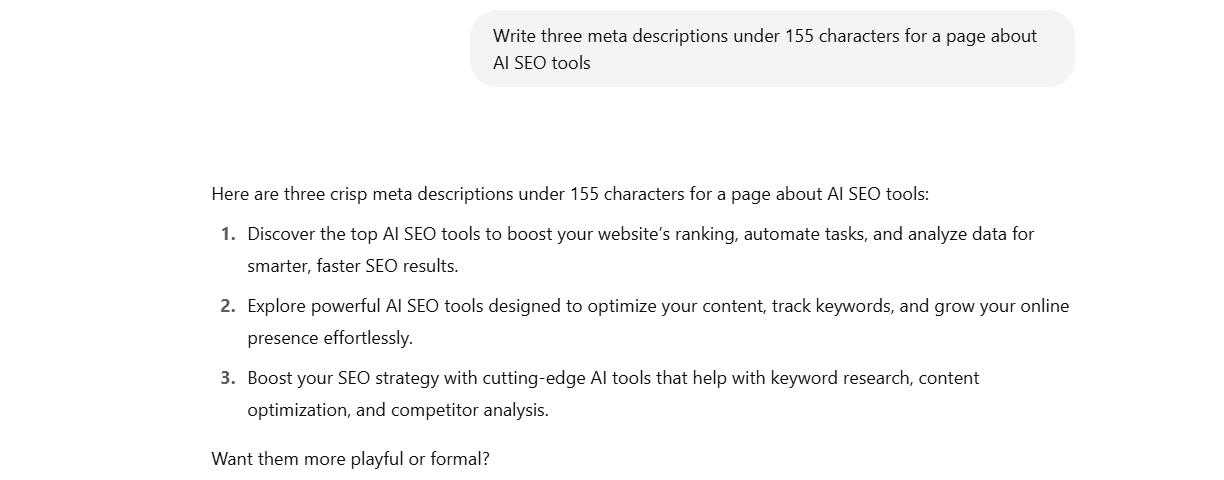
With the Nightwatch SEO AI Agent, you can automatically review the meta tags across your site to see which ones are underperforming or not optimized for relevance, length, or clarity.
It may recommend trimming overly long titles, swapping in high-impact keywords, or rephrasing descriptions to better match user queries.
8. Local SEO Enhancement
If your business relies on attracting customers in a specific geographic area, then local SEO is non-negotiable. Showing up in local search results, Google Maps, and “near me” queries can be the difference between a steady flow of foot traffic and being invisible to potential customers nearby.
The Nightwatch SEO AI Agent is a powerful ally here. It analyzes how well your website is currently optimized for local keywords and provides a breakdown of what’s working and what needs improvement.
For example, it might highlight underused city-specific terms or point out pages lacking location markers like “New Mexico,” “Albuquerque,” and so on.
It also offers actionable suggestions for building local citations, enhancing on-page localization, and strengthening your presence on Google Business.
ChatGPT complements this with creative firepower. Need content ideas that appeal to a local audience? Just prompt it with something like,
“Generate blog post ideas that target AI agencies in New Mexico,” and it will return relevant, geo-targeted content themes.
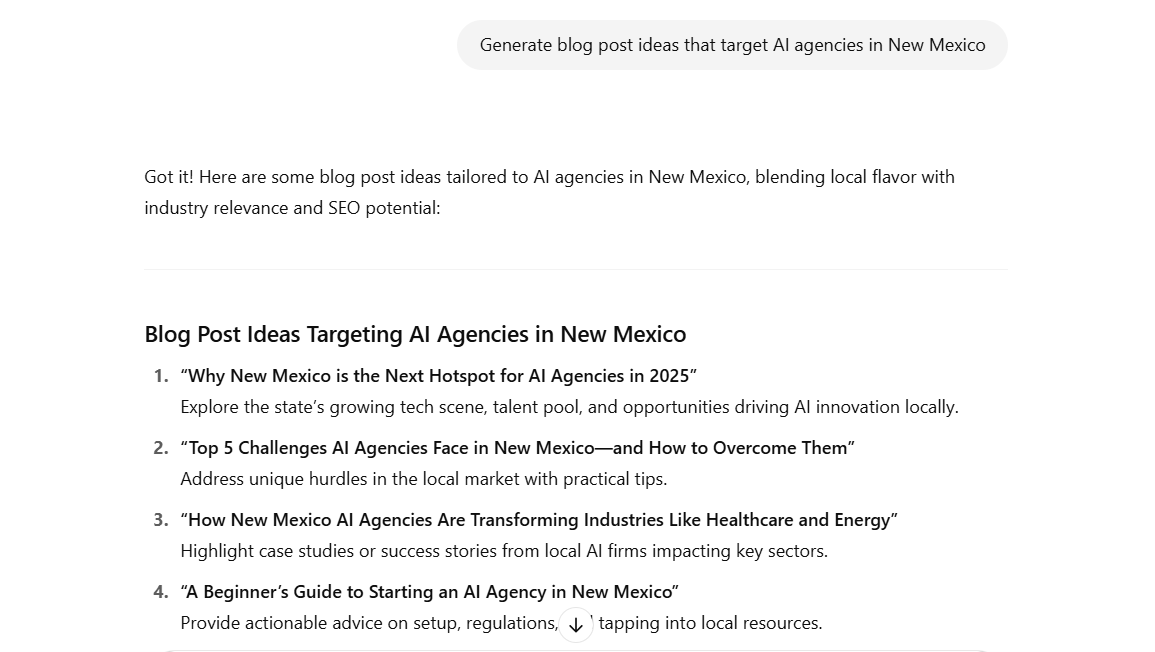
You can also use it to generate localized FAQs, tailored service descriptions, or landing page copy that speaks directly to your community.
9. Content Gap Analysis
Content gap analysis is the process of identifying topics or keywords your competitors are ranking for that you haven’t addressed yet.
By filling these gaps, you not only boost your topical authority but also attract new, untapped traffic your site might be missing out on.
AI makes this process faster, smarter, and more strategic. They can compare your content with your competitors’ to reveal the exact areas where you’re falling behind, and more importantly, where the biggest traffic opportunities lie.
Here’s a prompt you can use for this:
“Identify content gaps between my website [insert your domain] and my top competitors [insert their domains]. Show the keywords or topics they rank for that I don’t, along with search volume and ranking URLs if possible.”
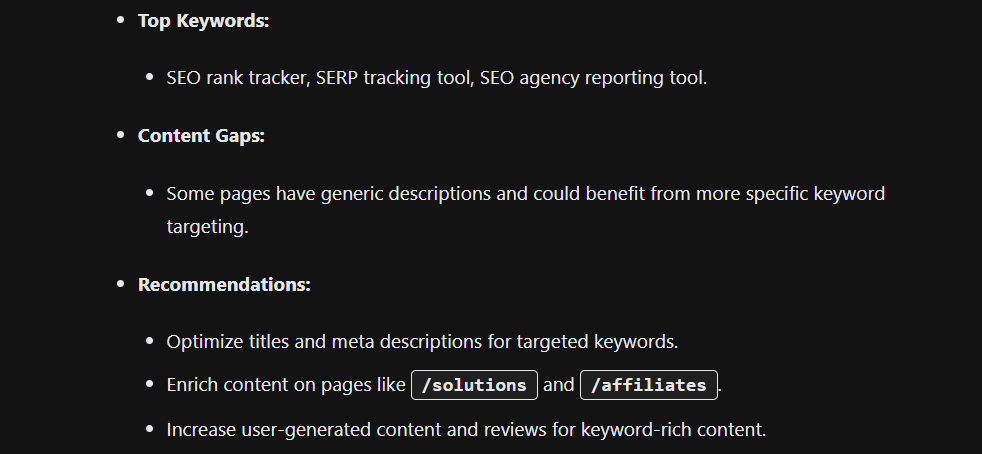
The tool analyzed my site side-by-side with top-ranking competitors to uncover content gaps—topics, questions, or keywords they’ve covered that you haven’t.
10. Predictive SEO
AI takes predictive SEO from guesswork to strategy. It analyzes historical data, emerging patterns, and shifts in user behavior to forecast which topics are gaining traction and which search terms are poised to spike in demand.
This allows you to create future-ready content that captures attention early when competition is still low.
With the Nightwatch SEO AI Agent, you can monitor rising keyword trends and track subtle shifts in the SERPs before they become obvious to everyone else. Here’s a prompt for that:
“Analyze current search trends and emerging topics in [insert industry or niche], and predict high-potential keywords or content topics likely to gain search volume in the next 3–6 months. Include estimated search volume growth and topic relevance.”
The tool will pick up on new search queries, content formats, or topics that are starting to gain visibility, helping you plan your content calendar around what’s about to matter.
For example, if the AI detects a growing interest in “AI-driven SEO tools for small businesses,” you can start writing about that before it becomes saturated.
Challenges of Using AI for SEO (and How to Overcome Them)
While AI has undoubtedly made SEO faster and more efficient, it’s not a magic wand.
Like any tool, it comes with its own set of limitations and risks.
Being aware of these pitfalls can help you use AI responsibly and effectively.
Here are some common challenges you might encounter, along with tips on how to navigate them:
1. Keyword Stuffing
One of the most frequent issues with AI-generated content is keyword overuse.
Some tools tend to prioritize keyword density over readability, resulting in robotic-sounding text that may hurt your rankings or turn off readers.
To fix this:
- Manually review AI outputs to ensure keywords flow naturally and are placed in a way that serves user intent.
- Use keyword variations, synonyms, and related terms.
- Read content aloud. If it sounds awkward or repetitive, revise it for a smoother tone.
2. Maintaining Originality
AI generates content by predicting what comes next based on training data. That means its default mode is often safe, familiar, and sometimes even boring.
The result?
Bland content that lacks a unique voice or fresh insight.
If you want to stand out:
- Add your own commentary or experience to AI drafts. Share personal stories, data insights, or unique angles.
- Let AI brainstorm or structure your ideas, but write with your personality and expertise.
- Run your content through plagiarism checkers to catch any accidental duplication or overly templated phrasing.
3. Ethical Concerns
AI doesn’t fact-check itself. It can confidently present outdated, biased, or entirely false information.
If you blindly publish AI-generated content, you risk spreading misinformation or damaging your credibility.
Here are some tips to stay ethical:
- Always verify claims, stats, and quotes against reliable sources before publishing.
- Avoid spinning content or mass-generating articles just to build links. This can trigger spam penalties from Google.
- Be transparent about AI use if required by your industry or audience, especially for content that affects decision-making.
4. Over-reliance on Automation
If you lean too heavily on AI, you risk publishing content that lacks depth, nuance, or connection with your audience.
But here’s how you can strike a balance:
- Keep humans in the loop. Let AI do the heavy lifting, but rely on editors, strategists, and writers for final judgment.
- Use AI to gather insights, but make sure your SEO decisions are aligned with long-term business goals.
- Treat AI like a junior assistant. It’s fast, but it still needs direction.
Frequently Asked Questions (FAQs)
Can SEO be done by AI?
Yes, many aspects of SEO can now be done by AI. While AI may not fully replace human strategy and creativity, it significantly enhances SEO by automating repetitive tasks, analyzing large datasets quickly, and generating insights. AI can help with keyword research, content optimization, technical audits, competitor analysis, and even writing content drafts.
Is there any AI tool for SEO?
Absolutely. There are many powerful AI SEO tools you can use for SEO like Nightwatch SEO AI Agent and ChatGPT.
You can use the agent to monitor rankings, conduct keyword research, suggest improvements, detect SEO issues, and generate optimization insights across large websites, while ChatGPT can help draft content, perform content gap analysis, and optimize existing copy.
Each tool serves different purposes, and combining a few based on your needs is often the best approach.
Let AI SEO be Your Co-pilot!
With tools like Nightwatch and ChatGPT, marketers can execute smarter strategies, scale efforts more efficiently, and adapt to algorithm changes with greater agility.
Yes, AI SEO comes with a learning curve and potential pitfalls, but when used strategically, the advantages far outweigh the challenges.
Your marketing teams can work faster, make data-driven decisions, and stay ahead on the SERPs.
There’s no better time to start.
Integrate AI tools like Nightwatch and ChatGPT into your SEO workflow, and see how quickly they can drive meaningful results.
